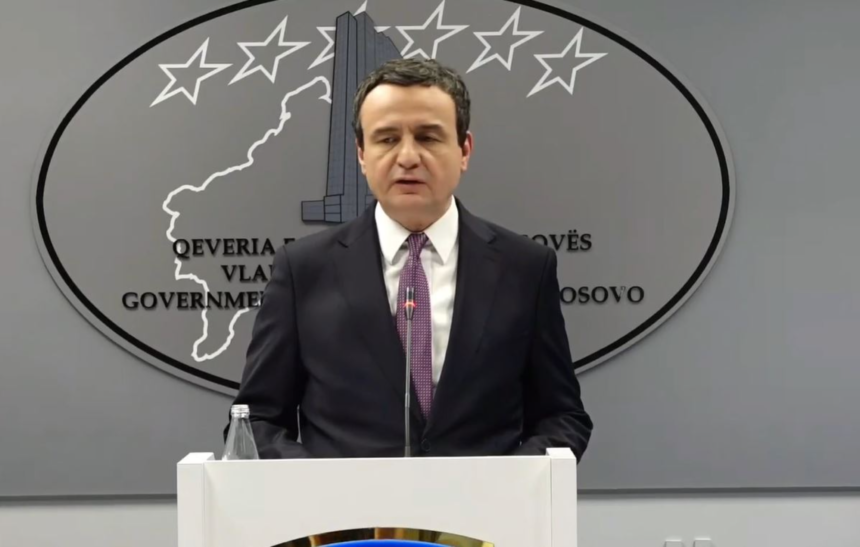Kosovo’s Prime Minister, Albin Kurti, stated on Tuesday that Milan Radojičić ordered the attack on the Ibër-Lepenc Canal on November 29, while the state of Serbia is responsible for financing, planning, and providing logistics for the attack, which aimed to jeopardize national security.
In a press conference, Kurti said that these statements are based on intelligence data and security authorities’ reports.
According to him, the support that official Belgrade provides to what he called Milan Radojičić’s “terrorist group” can only be considered as coordination between the Serbian state and this group, aiming to intensify the hybrid war against Kosovo.
“The November 29 attack on the Ibër-Lepenc Canal is a continuation of the acts and terrorist attacks, as well as other destabilizing activities carried out by Serbia’s influence mechanisms in Kosovo, including Serbian terrorist organizations. Considering that such terrorist acts require professional preparation in diversion, and the fact that Milan Radojičić is supported by Serbian state structures, it is assessed that the explosion on the Ibër-Lepenc Canal was also supported with planning and logistics from the Serbian state,” Kurti stated.
Serbian Foreign Minister Marko Djuric responded, saying that Kurti’s accusations are “another attempt to divert attention from the undemocratic actions of his government, including the exclusion of the Serbian List from the upcoming elections.”
In a post on X (formerly Twitter), Djuric said such actions “are insults to democracy and a clear threat to regional stability.” He added that Serbia would not engage in what he called “theatrical provocations” from Kurti.
The day before, U.S. Ambassador to Serbia, Christopher Hill, said that the U.S. “sees no evidence that would lead to Belgrade” in relation to the attack on the Ibër-Lepenc water supply canal.
“We certainly do not see any evidence that would lead to Belgrade, but someone did it, and a full investigation should be carried out,” Hill said in an interview with Serbia’s public television, RTS.
However, according to Kurti, the attack could not have been carried out by Radojičić’s group without the backing of the Serbian state.
“Such methods of challenging security in Kosovo, which result not only in damaging vital infrastructure but also in inciting interethnic incidents, which Serbia strongly encourages, creating panic among citizens, and ultimately creating an image of an unstable country, are expected to continue in the near future, especially before and after the New Year,” Kurti stated, pledging that authorities are committed to neutralizing this remaining Serbian method.
Kurti presented a chronology of 15 attacks, which he claimed were aimed at damaging Kosovo “in a terrorist manner” from June 30 to November 29 of this year, culminating in the attack on the Ibër-Lepenc Canal.
The Ibër-Lepenc Canal was attacked on November 29 in the village of Varragë, in the municipality of Zubin Potok – a Serb-majority municipality in the north of Kosovo.
Kosovo Police said the attack was carried out with explosive material weighing up to 20 kilograms.
The Ibër-Lepenc Canal supplies water from Lake Ujman to the entire northern part of Kosovo, the Mitrovica and Pristina regions, and the Kosovo Energy Corporation for cooling its thermal power plants.
Kurti said that Radojičić – who is currently believed to be free in Serbia – authorized people to carry out attacks in Kosovo several times throughout the year.
Milan Radojičić is wanted by Kosovo authorities for admitting to organizing and carrying out the attack in Banjska, Zvečan, in September 2023.
As a result of this attack, which Kosovo considers terrorist and blames Serbia for, Kosovo Police officer Afrim Bunjaku was killed.
Serbia, on the other hand, denies these accusations.
Among other things, Kurti said that Serbia’s refusal to extradite Radojičić has encouraged the group led by Radojičić to continue with other acts “against the territorial integrity and sovereignty of Kosovo.”
For the authorities in Kosovo, the attack on the Ibër-Lepenc Canal was the most significant attack on the country’s critical infrastructure since the 1998-1999 war.
The attack has been strongly condemned by both the United States and the European Union, with calls for the perpetrators to face justice.
U.S. Ambassador to Kosovo, Jeffrey Hovenier, said recently that U.S. Federal Bureau of Investigation (FBI) agents are directly engaged in Kosovo in the investigation to find the perpetrators behind the Ibër-Lepenc Canal attack.







